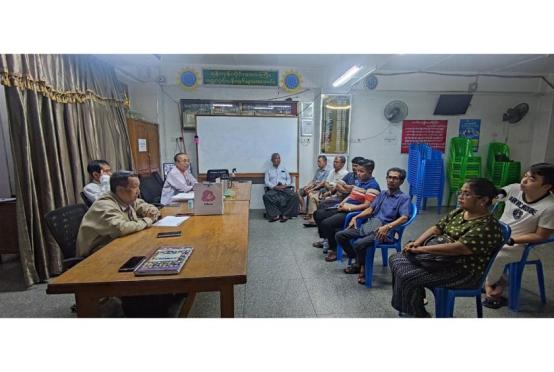Kathmandu (The Kathmandu Post) - Non-government organisations which were converted into microfinance institutions as per the policy of Nepal Rastra Bank need to deposit the reserve fund they earned in the capacity of NGO into the government’s treasury, the Office of the Auditor General has said.
The auditing body said that such fund should go to the state coffers as per the Associations Registration Act, under which these NGOs were registered at the concerned District Administration Office before they were converted into microfinance institutions.
In its latest performance audit report, the Auditor General’s Office has stated that 17 NGOs, which were either converted or were in the process of being converted into a microfinance institution, generated Rs1.36 billion in their reserve fund as of the fiscal year 2017-18.
Of 24 such NGOs monitored, the finance watchdog found the amount in the reserve fund of 17 NGOs which have either been converted or were in the process of being converted into microfinance institutions.
According to the office, all these NGOs have brought the reserve fund under the microfinance institutions, which are profit makers.
But the auditor general’s office said that the reserve fund maintained in the capacity of NGOs cannot be transferred to a microfinance institution’s ownership because the law does not allow the NGOs to use such fund to be distributed as bonus shares and dividend.
“Since these NGOs have been converted into companies, the amount in the reserve fund should go to the government’s treasury ” the report states.
If the auditing body’s recommendation is followed, microfinance institutions such as Gramin Swayamsevak, Sweda, Mahila Laghubitta, Manushi, Adarsha, Unique Nepal, Smart, Mahila Samudayik, Jalpa, Salva, Upakar, Rastra Utthan, Nesto Sambridhdha, Dhawalagiri, Jeewan Bikas, Atmanirbhar, NRN Laghubitta and Super Laghubitta need to deposit the amount from the fund into the government’s treasury.
Not only these new microfinance institutions, the auditing body has also recommended probe into microfinance institutions which were converted into companies long ago. These include Nirdhan Utthan, Forward Community, Nagbeli, Swawalamban and Chhimek.
If any NGO gets dissolved for being unable to follow its statute, the asset of such organisation goes to the state coffers as per Section 14 (1) of the Associations Registration Act. Nir Prasad Subedi, director of the auditing body, said conversion of the NGOs into microfinance institutions is as good as NGOs being dissolved. “So the reserve fund should go to the state coffers,” he told the Post.
But officials at the microfinance institutions converted from NGOs said they had brought the reserve fund of their NGOs in line with the central bank’s policy.
As per Clause 2 (B) of the Nepal Rastra Bank Policy on conversion of NGOs into microfinance institutions, the concerned NGOs should create a separate reserve fund from the earlier reserve fund in order to sustain the investment of the newly created microfinance institution.
According to Krishna Neupane, chief executive officer of Mahila Laghubitta, they had brought the NGO reserve fund under the microfinance institution in line with the central bank’s policy.
“The Auditor General Office’s assumption that the reserve fund is used for distributing bonus shares and dividend is flawed. It is the fund created for emergency purposes—for instance, for medical treatment of our staff and their families, helping victims of natural disasters and meeting the expenses for training for women who receive credit facility from us,” he said.
Janardan Dev Pant, chief executive officer of Nirdhan Utthan, said that his institution became a part of a microfinance institution from an NGO in 1998 and it did not have a reserve fund at that time.
Although these NGOs were registered at the District Administration Office as non-profit organisations, the Act Relating to Institutions Acting as Financial Intermediary-1998 opened the door for NGOs to work as financial intermediaries with licence from the central bank.
Then a number of NGOs were permitted to do limited banking activities in the name of extending financial services to rural areas.
After the NGOs, which were registered as non-profit institutions, started to work for profit, many District Administration Offices denied renewal of such NGOs, arguing that they cannot engage in business.
“This led us to make a policy on transforming NGOs as part of a microfinance institution. We had also received complaints from these NGOs because their investment of million of rupees was at stake,” said Chintamani Siwakoti, deputy governor of the central bank. This policy allowed the NGOs and the people associated with them to open microfinance institutions by investing a maximum 51 percent of their total paid-up capital.
The auditing body has questioned the policy itself, saying that this allowed the people who operated NGOs for social service to become promoter shareholders and owners of the company.
“The government has not taken any measures to control the acts that are against the objective and spirit of the NGOs,” the report states.
Shiwakoti said the central bank has adopted the policy to encourage the NGOs to divest their shares to ensure that NGOs no longer hold stakes in a profit-making company as the Office of the Company Registrar has come up with its own rules not to allow NGOs to hold shares in a company.
http://kathmandupost.ekantipur.com/news/2019-04-22/ngos-turned-microfina...















